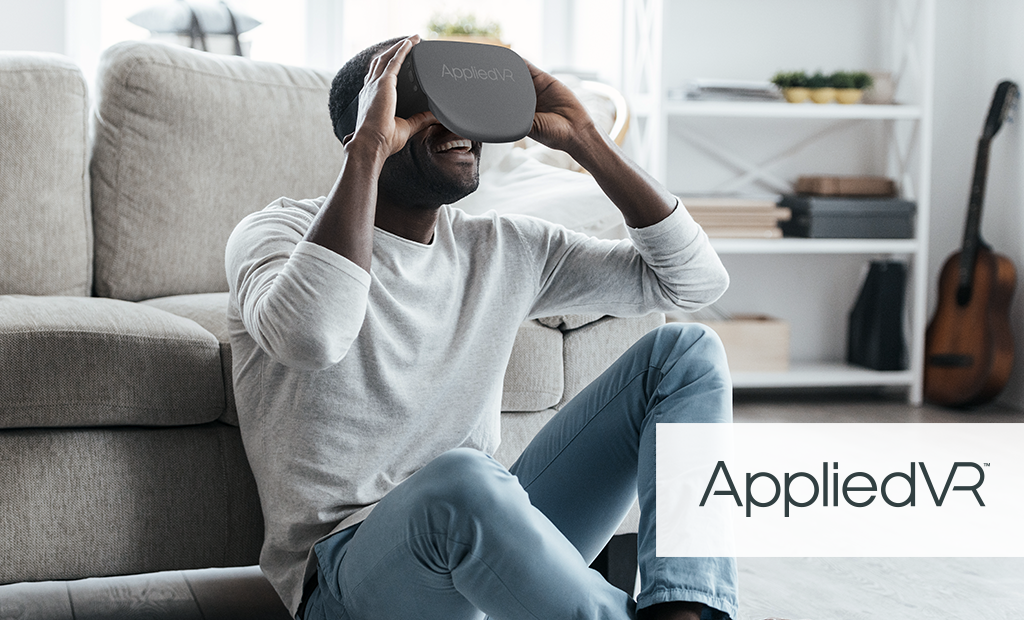
July 13, 2020 – AppliedVR, a provider of virtual reality (VR) therapeutics, has recently announced results from the first randomized controlled trial, evaluating VR-based therapy for self-management of chronic pain at home.
The study was conducted by departments from Stanford University School of Medicine and the University of Houston, along with the L.A. Pain & Wellness Institute, as well as AppliedVR, and was published in JMIR-FR. It found that a self-administered, skills-based VR treatment program was not only a feasible and scalable way to treat chronic pain, but was also effective at improving on multiple chronic pain outcomes.
According to AppliedVR, with the COVID-19 pandemic disrupting Americans’ ability to seek care in clinical settings safely, demand for home-based virtual care has increased, forcing providers, insurers and policymakers to expand access to digital medicine. The study sought to demonstrate the feasibility and efficacy of people using the AppliedVR program at home on themselves to manage their chronic pain. The study conducted by the team compared VR to the same treatment delivered in an audio-only format, and found that VR was superior at delivering on desired outcomes.
AppliedVR stated that the study analyzed data from 74 people who suffer from chronic lower-back or fibromyalgia pain over a 21-day period and showed that participants using AppliedVR’s EaseVR program significantly reduced five key pain indicators – each of which met or exceeded the 30-percent threshold for clinically meaningful. On average, participants noted that:
- Pain intensity reduced 30 percent;
- Pain-related activity interference reduced 37 percent;
- Pain-related mood interference reduced 50 percent;
- Pain-related sleep interference reduced 40 percent; and
- Pain-related stress interference reduced 49 percent.
“People with chronic pain often have limited access to comprehensive pain care that includes skills-based behavioral medicine. We tested whether VR that was self-administered at home would be an effective therapy for chronic pain,” said Dr. Beth Darnall, AppliedVR’s Chief Science Advisor, who co-authored the study. “We found high engagement and satisfaction, combined with clinically significant reductions in pain and low levels of adverse effects, support the feasibility and acceptability for at-home, skills-based VR for chronic pain.”
AppliedVR’s EaseVR program helps patients learn self-management skills and provides them with biofeedback and mindfulness strategies. The program was designed by AppliedVR, in partnership with pain experts and researchers, to improve self-regulation of cognitive, emotional and physiological responses to stress and pain.
The US CDC reported that 20 percent of US adults suffer from chronic pain, with 8 percent experiencing high-impact chronic pain. This ultimately increases costs for healthcare providers, as pain is often treated with pharmacological interventions, including opioids, which can be costly over a lifetime and have short- and long-term side effects. As a result, providers are turning to digital medicine as a solution that supports patient treatment.
“This study is a fundamental step for advancing a clinically proven, noninvasive and safe digital therapeutic like VR for chronic pain, and demonstrates our platform is both viable and efficacious,” said Josh Sackman, co-founder and President of AppliedVR. “Living with and managing chronic pain daily can be a debilitating and costly challenge, and many patients suffering from it can feel hopeless and desperate for any relief. So, as we engage in and accelerate more in-depth clinical research, we want them to know that we’re committed to making VR a reimbursable standard of care for pain.”
AppliedVR states that it has applied the study’s results to expand its program to eight weeks, which will be tested later this year in additional trials. Furthermore, the company added that it is advancing two clinical trials with Geisinger and Cleveland Clinic to study VR as an opioid-sparing tool for acute and chronic pain – specifically the company’s RelieVRx and EaseVRx platforms. The National Institute on Drug Abuse (NIDA), part of the National Institutes of Health (NIH), recently awarded USD $2.9 million grants to fund the trials.
Image credit: AppliedVR
About the author
Sam Sprigg
Sam is the Founder and Managing Editor of Auganix. With a background in research and report writing, he has been covering XR industry news for the past seven years.




